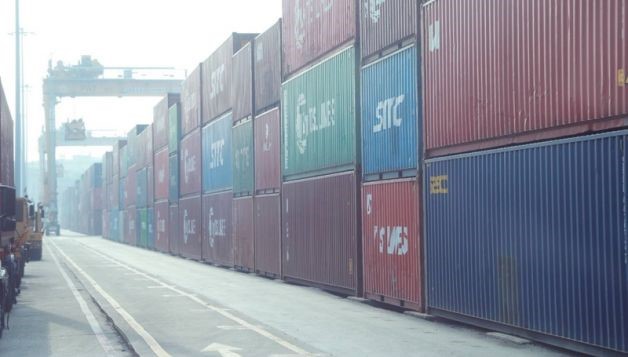
Deputy Prime Minister and Minister of Commerce (in the middle) went to the area of Port Authority of Thailand,
photo by Ministry of Commerce
The corrugated paper box industry is facing a crisis as prices of ocean freights have skyrocketed up to 3 or even 10 times compared to the 1st half of this year, and increased 30-35 percent in case of packaging raw materials cost. COVID-19’s effect has made a record-breaking cost in many ways which is threatening to turn the business down not only the United States of America, Thailand and India but also many countries around the globe.
Next, China has officially announced a Ban of waste paper imports from January 2021 and as a result, the Chinese paper mills are stocking up the waste paper supplies available in overseas markets. Both China and India import their waste paper primarily from the USA and Europe for kraft paper manufacturing.
About situation of Thailand in DEC 2020, many shipments were postponed to January next year and the new offer for next year has been pending by some suppliers because of no available space on vessels or could not book the containers, which affected to hesitation of some buyers for a new contract.
In the event that the Thai National Shippers’ Council (TNSC) makes a proposal to the Thailand government to accelerate the solution of container shortage and freight hikes from the COVID-19 situation. On 14 DEC, Mr. Jurin Laksanawisit, Deputy Prime Minister and Minister of Commerce went to the area of Port Authority of Thailand to accelerate this problem. Problems with increasing Freight, Local Charges, Surcharge, Reservation problem, Unstable cargo allocation area on board, or even the booking may be canceled due to Insufficient ship space impacted exports greatly and being a Big issue for Thai exporters, to bear Higher prices. Due to the COVID-19 situation, it also causing containers to get stuck in factories or at some closed companies. At present, the Minister of Commerce had listened to the problems from the private sector and considering for any solutions that will be able to help reduce some private expenses.
As previously, TNSC stated that the COVID-19 situation, the Export & Import process of shipping containers takes a long time and has resulted in increasing freight costs. By many exporters reported to TNSC about problems of rising freight charges, for instant, the shipping lines cost to the United States increased more than 3 times and also found that the charges for the port area, service fees, container lifting fee, documentation fees increased by an average of 10% to Exporters’ increased cost burden.
Some of the data also indicated that the unusually high freight charges during this period caused by the factories in many countries closed factories during first wave of the COVID period. Resulting in shipping containers stuck in warehouses around the world. Thus, there was a competition for the containers in the shipping companies to serve the products used for export. Assuming that the price increase is likely due to local charges provided by logistics brokerage firms or shipping forwarders, which bring together exporters and container owners.
The preliminary conclusion to solving the Ministry of Commerce will work with the Port Authority of Thailand and the private sector to find a way to bring empty cabinets to fit in with usability and import old containers to repair them for reusing, with incentives to reduce the cost of importing empty containers and old containers.
In addition, they will also be preparing to find a way for ships with a size of 400-meter or more to enter the Laem Chabang Port, instead of allowing only 300-meter vessels to be able to carry more cargo and find another way to deliver cargos without using containers. On the issue of booking the containers being canceled, the Office of Trade Competition Commission (OTCC) will take care of the complaint. And for small entrepreneurs to reserve a container in advance through the Thai International Freight Forwarders Association (TIFFA).

As for the service charge problem Port Authority of Thailand and the private sector will find ways to reduce expenses to lighten the burden to operators for 6 months or until June 2021. Meanwhile, the Ministry of Commerce will assist exporters for the domestic service rates (Local Charges) based on the Act on Prices of Products and Services B.E. 2542 (ver. 1999) for supervising. And requesting to keeps the domestic service rates according to the 2018 rate, while the additional charge rate (Surcharge) request to be in accordance with the global market fee, but must be fair and the container reservation must not be canceled. As for the unfair trade monopoly in relation to the limitation of the quantity of shipping containers from shipping lines, it was entrusted to be under control of OTCC, as one of the Emergency topics. Solving this problem may not be the most urgent case for the government sector, however, if it resolves the problem quickly, it will benefit export business in the last quarter of this year.
Finally, from the viewpoint of our Sales director, China will be preparing for the Chinese New Year in early February, but the containers will be tight until at least the Chinese New Year, so the exportable quantity will be extremely limited. Freight remains at high cost, Container’ Free time and demurrage period seems to be the same conditions as in December. If you can get a certain price, book a vessel, and able to secure some containers, Exports in January will be possible. However, at this point no one can guarantee about costs.
If you would like to know more on Thailand situation, please drop us an email at sales@daiwashiryotrading.com
